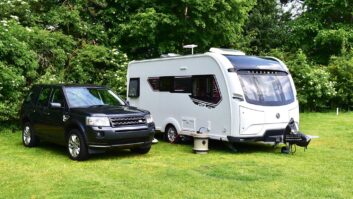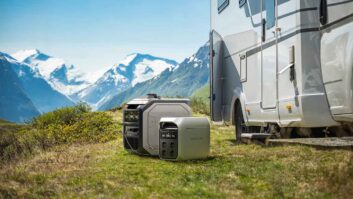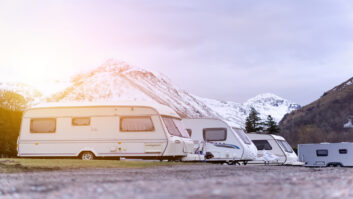Most of us love a big site with extensive amenities and electric hook-up, but they rarely offer the truly mind-blowing vistas of the many smaller campsites dotted around the UK’s amazing landscapes, which is where off-grid touring comes in.
The best caravan sites don’t necessarily have to offer full-facilities. In our country’s most beautiful spots, campsites can’t necessarily get planning permission to construct much in the way of facilities, so small sites with limited amenities are often to be found there. While these sites may be tiny, and force you to rely on your caravan’s own facilities, it is these very limitations that make them so charming and appealing. Caravanning off-grid works out cheaper than using full-facility sites, so you can spend longer away for the same outlay.
Simply by adapting your caravanning techniques, you can go off-grid touring at some of Britain’s most beautiful campsites, and still maintain almost all of the comforts you’d experience on a full-facility site. Off-gridding is definitely not about roughing it – just see it as an opportunity to save some money, and the planet!
If you are new to off-grid touring, here are our top tips for a smooth stay…
1. Start small
Start small and spend one or two nights away. This will give you a good opportunity to learn more of the ways of the off-gridder and hone your minimal energy use skills. You’ll also discover how much energy and water you normally use and how that can be fine-tuned, as well as the generating capabilities of your solar panel.
2. Have a suitable leisure battery
Start by acquiring the best caravan leisure battery for off-gridding – a 110Ah battery should do the trick, or splash out on a lithium one if your wallet can handle it. Off-grid, you won’t have electric hook-up, so you will need to keep it topped up.
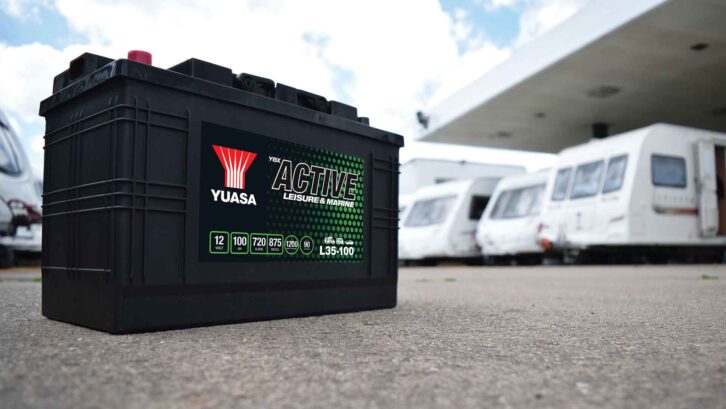
For standard leisure batteries, 12.7V is fully charged, 12.2V means it’s time to plug in or risk the battery equivalent of a midlife crisis. For lithium units, 13.3-13.6V is fully charged, while 13V means there’s around 20% of charge remaining. Lithium batteries can be discharged further than lead-acid ones without damaging them.
3. Consider more than one battery
Experienced off-gridders will often take two batteries with them. They can be run together or have a simple switching system, so you can swap the power sources when one is flat.
4. Know the advantages of gas
Gas is king when you’re off-gridding. You can use it for your heating and cooking, for chilling your fridge and for powering up your barbecue. Take two gas bottles if you’re a heavy user, and remember, if you’re caravanning in winter, propane works in very cold weather (below -2°C), butane doesn’t.
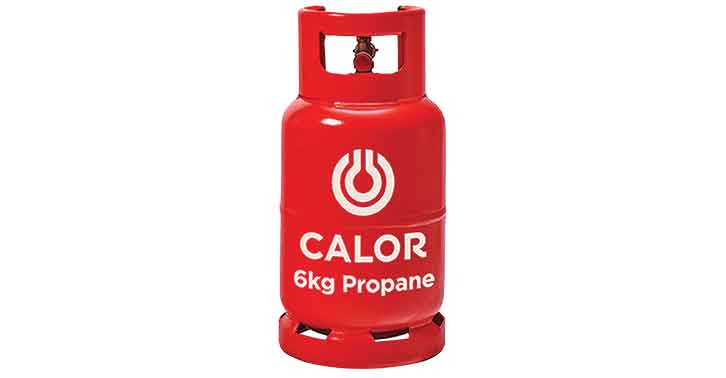
5. Think about a self-fill gas system
Heavy gas users (all off-gridders?) should consider investing in a self-fill gas system, such as Safefill or Gaslow. These allow you to fill gas bottles yourself with Autogas, on petrol station forecourts (for example, all Morrisons petrol stations, among others). The cost is typically about 30% of buying prefilled bottled gas from Calor.
6. The advantages of photovoltaic solar panels
Photovoltaic solar panels are great for summer, and as they need light, not heat, they work on cloudy days, too – although they will create less charge. A 150-200W panel with a charge controller will trickle-charge your battery nicely. Roof-mounted panels are fit and forget, but moveable ones give you sun-tracking bragging rights. Remember to leave them facing east at night, so you grab all that direct morning sunlight.
7. Pick the right solar panel
Choose a solar panel that has IEC 61215 certification, from a dealer/manufacturer with a solid reputation, and one offering a good warranty. You might also consider a Maximum Power Point Tracking controller, which can extract up to 20% more from your panel.
8. Pack appropriately
Even with a solar panel, it pays to be power-savvy. Microwaves, hairdryers and other high-wattage gadgets are a no-go. Stick to essentials and you’ll soon know what you can get away with. Many devices and appliances are available in 12V formats from caravanning stores.
9. Watch the payload
Going off-grid means packing extra bits, so make sure you’re aware of the relevant caravan weights. Keep an eye on your payload if you’re also packing a solar panel, extra battery and gas bottle – you may need to leave some of your luxury caravan accessories at home if it comes to it.
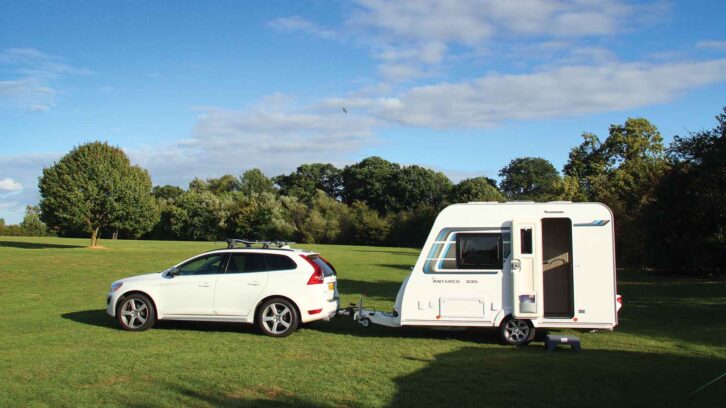
10. Keep the fridge cool
Pre-chill your fridge before you leave home, and fill it with chilled goods, and some pre-frozen meals or dog food in the freezer compartment. This will help the fridge to stay cold, and consume less gas.
11. Enjoy an al fresco feast
Who doesn’t enjoy a nice meal cooked on the best caravan barbecue? Take along a charcoal barbecue for al fresco meals and a bit of extra heat if you’re sitting outside your awning on a summer’s evening. Rechargeable fans are also available – great for warm nights in the caravan.

12. Grey-water waste
Your grey-water waste can be used to water nearby hedges. They’ll appreciate it in the summer – check with the site owner first, though.
13. The advantages of a powerbank
Consider taking powerbanks for charging phones and other small devices. That way, you’ll always have a working phone, even if you do manage to flatten the caravan battery!
14. Stay connected
If you love off-gridding, but can’t be without the best caravan TV and streaming, you’re going to need good caravan internet. The latest sat dishes and mobile internet solutions work in many remote areas.
15. Water tanks and canisters
Serious off-gridders might go for a caravan with an on-board water tank, or fit an extra water tank. These can hold up to 40 litres. Alternatively, just take a large water canister with you and add purification tabs to avoid any rural-source surprises.
16. Conserve battery power
There are lots of ways you can conserve your battery power, for example by wearing an extra jumper inside, and bed socks at night, rather than turning up the heating. Converting to LED lighting and using hand sanitiser are also sensible options.
17. Offline entertainment
Bring games, books and offline music to keep all entertained. Streaming might not be an option, so download before you go.

18. Prepare entertainment in advance
Watching films on a fully charged laptop is a nice treat. Charge it up in the daytime so it’s ready for evening use. Turn the screen brightness down a little to conserve its battery.
19. Pitching up in wet conditions
After heavy rain, don’t rush onto a grass pitch – wet grass is the most slippery substance in the world, and two-wheel drive cars struggle. If the worst happens, there’ll probably be a farmer nearby with a tractor!
Before setting off on any trip, whether it’s for off-grid touring or to a site with full facilities, you’re going to want to make sure your van is clean and tidy so you can properly relax – that’s where the best caravan vacuum cleaner comes into its own.
Future Publishing Limited, the publisher of Practical Caravan, provides the information in this article in good faith and makes no representation as to its completeness or accuracy. Individuals carrying out the instructions do so at their own risk and must exercise their independent judgement in determining the appropriateness of the advice to their circumstances and skill level. Individuals should take appropriate safety precautions and be aware of the risk of electrocution when dealing with electrical products. To the fullest extent permitted by law, neither Future nor its employees or agents shall have any liability in connection with the use of this information. You should check that any van warranty will not be affected before proceeding with DIY projects.
If you’ve enjoyed reading this article, why not get the latest news, reviews and features delivered direct to your door or inbox every month. Take advantage of our brilliant Practical Caravan magazine SUBSCRIBERS’ OFFER and SIGN UP TO OUR NEWSLETTER for regular weekly updates on all things caravan related.




